|
JOINT
EU
PARLIAMENT OCEANS CONFERENCE
ABOUT -
CONTACTS - CROWDFUNDING
- DONATE - FOUNDATION -
HOME - A-Z INDEX
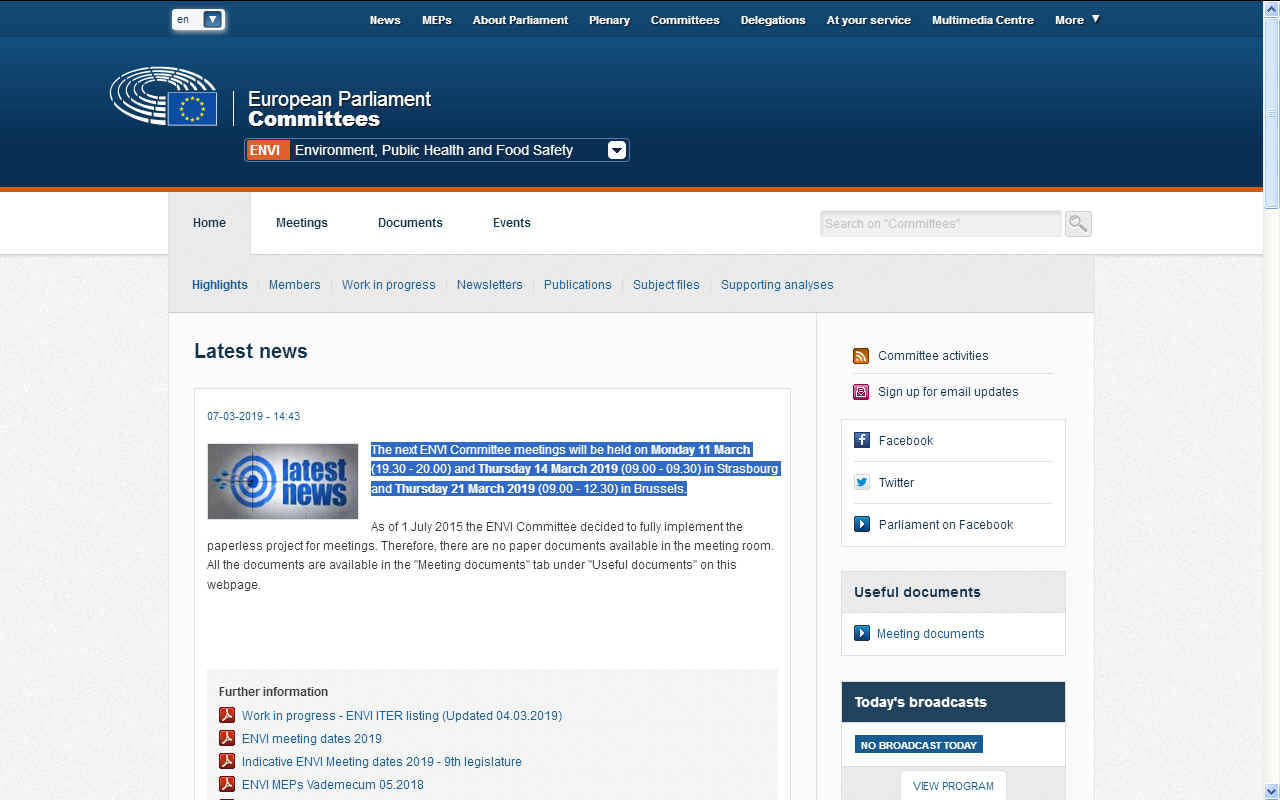
The European Parliament is made up of 751 Members elected in the 28 Member States of the enlarged European Union. Since 1979 MEPs have been elected by direct universal suffrage for a five-year period.
Each country decides on the form its election will take, but must guarantee equality of the sexes and a secret ballot. EU elections are by proportional representation. Voting age is 18, aside from Austria, where it is 16. Seats are allocated on the basis of population of each Member State. Slightly more than a third of MEPs are women. MEPs are grouped by political affinity, not nationality. MEPs divide their time between their constituencies, Strasbourg - where 12 plenary sittings a year are held - and Brussels, where they attend additional plenary sittings, as well as committee and political group meetings. The terms and conditions for Members are laid out in the Statute of 2009.
Worried about what is happening to our oceans? Take part in the conference on their future organised by the European Parliament and Commission taking place on 19
March 2019 in Brussels.
THE
IMPORTANCE OF HEALTHY OCEANS
The oceans are of crucial importance as they are home to a rich biodiversity, act as climate regulators and offer
food
security. They also contribute to the European economy with a turnover of €566
billion, providing jobs for nearly 3.5 million people.
However, oceans are under increasing pressure from climate change, over-fishing, marine litter and coastal eutrophication, which is when a body of water contains excessive amounts of minerals and nutrients. This usually leads to an overgrowth of plants and algae and later on a lack of
oxygen.
Oceans need to be managed sustainably in order to conserve the fragile marine ecosystems.
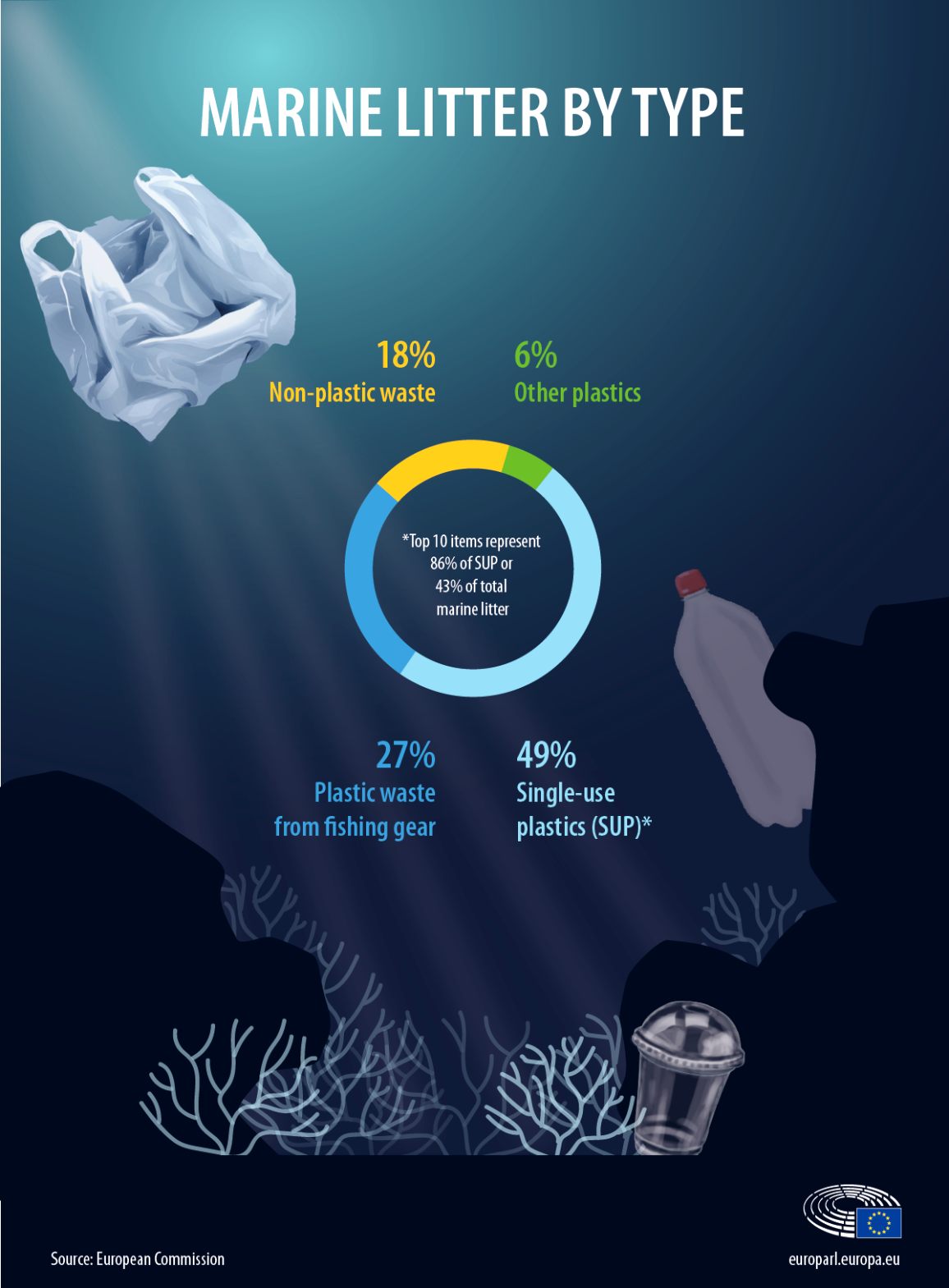
BRIEFING
Although oceans are essential to us in many ways, the state of marine biodiversity remains little known.
What we do know, however, is that human activities create a number of pressures such as
(over-) exploitation, carbon emissions, and pollution, including marine litter. The
European Union (EU) has been active in promoting the
sustainable use of the seas. In early 2018, the European Commission presented a strategy to address the issue of
plastics
pollution, including microplastics in our seas.
Oceans under pressure
Oceans provide essential benefits, not only environmentally, in terms of unique and beautiful natural
ecosystems, but also in terms of jobs and economic stability for many Europeans. In the EU, industries
whose activities rely on the seas and coasts are estimated to employ close to 7 million people. While some
maritime sectors (such as fisheries and
aquaculture) are stagnating, others are growing, in particular
offshore energy production, shipping, and coastal tourism and recreation.
Yet our knowledge about oceans, especially on the state of marine biodiversity, remains limited. We still
have no information on 80 % of marine species and habitats that need to be assessed under EU legislation.
We do know, however, that oceans are impacted by past and present human activities. The situation is
improving in some respects, but European seas are not yet in good shape. One pressure is
over-exploitation of living resources: although fishing pressure on commercial stocks has considerably decreased in the past
decade, many stocks are still being over-fished above their maximum sustainable yield.
Other pressures include climate change (affecting sea surface temperature); coastal eutrophication;
pollution by known contaminants (such as lead or mercury), emerging pollutants (such as pharmaceutical
products or endocrine disruptors) and marine litter (mainly plastics); ocean acidification as a result of carbon
emissions; and the introduction of non-indigenous species, mostly through shipping and the Suez Canal.
It is estimated that there are over 150 million tonnes of plastic in the world's seas and that, without significant
action, there may be more plastic than fish (by weight) in the sea by 2050. Some marine litter consists of
microplastics; these originate from the breaking down of larger plastic pieces or are released directly into the
environment. Directly released microplastics come mostly from the laundering of synthetic textiles (35 %) and
the abrasion of tyres while driving (28 %), while microplastics in personal care products account for 2 %.
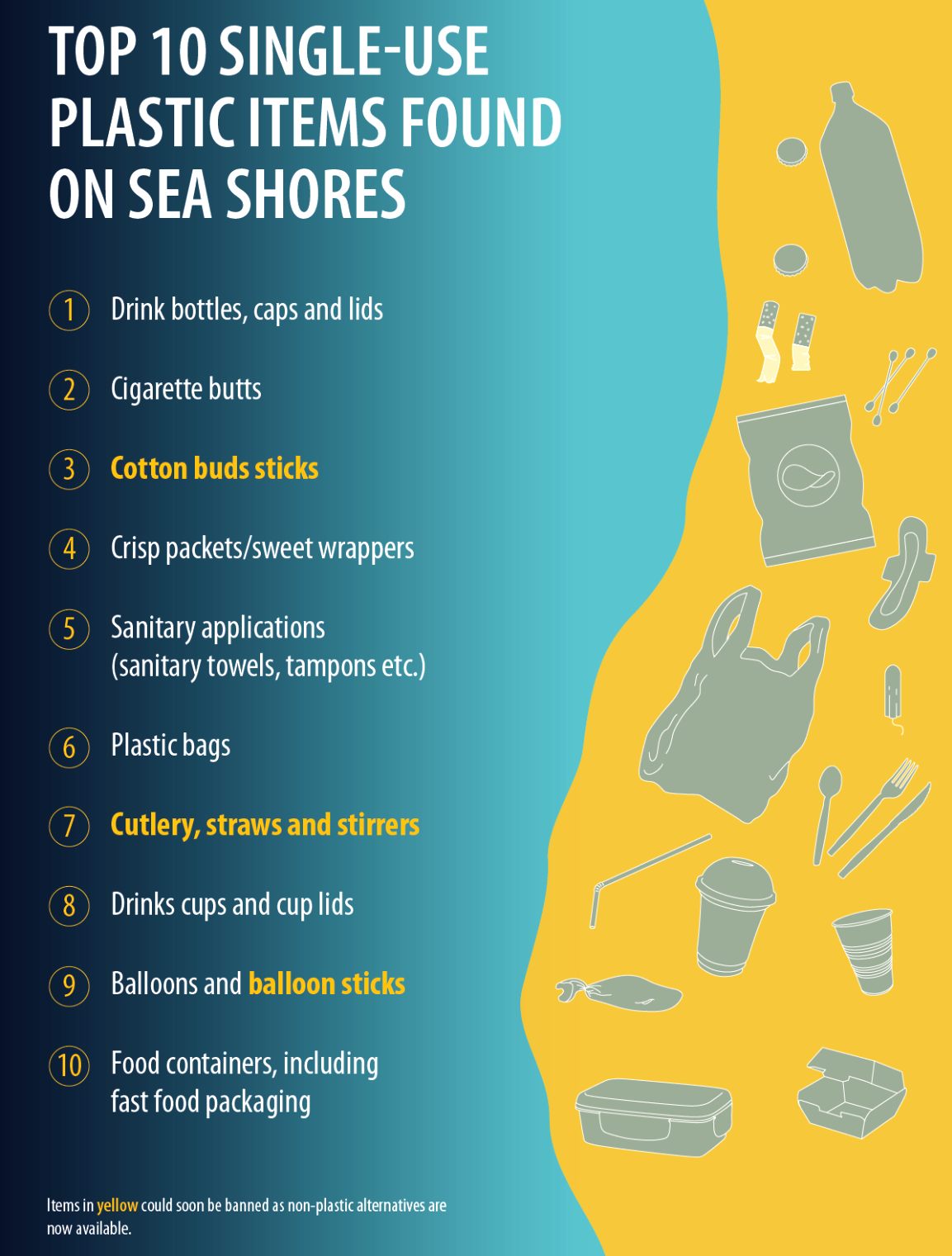
What is the European Union doing about it?
A common European policy on fisheries was first introduced in the 1970s and went through successive
updates. In 2008, the EU adopted legislation aiming to achieve good environmental status of European
marine waters by 2020, to promote the sustainable use of the seas, and to conserve marine ecosystems.
In
2013, the common fisheries policy was given a new direction. In particular, it requires the exploitation of
fish stocks to be based on the maximum sustainable yield, by
2020 at the latest. Also, in order to put an end
to the practice of discarding unwanted catches at sea, all catches of species subject to catch limits or, in the
Mediterranean, to rules on size, now have to be landed. On the issue of plastics, the European Commission
presented a strategy in early 2018, which aims to tackle sources of marine litter and
microplastics.
There are signs of improvements in a number of cases: in the
Baltic
Sea, the state of predators such as grey seals and white-tailed sea eagles has been improving over recent decades. The number of over-exploited
fish stocks in the North-East Atlantic has been steadily decreasing, and encouraging trends have been
observed for estuary fish diversity, as well as for the health of seabird colonies in areas that are now
protected from species such as rats.
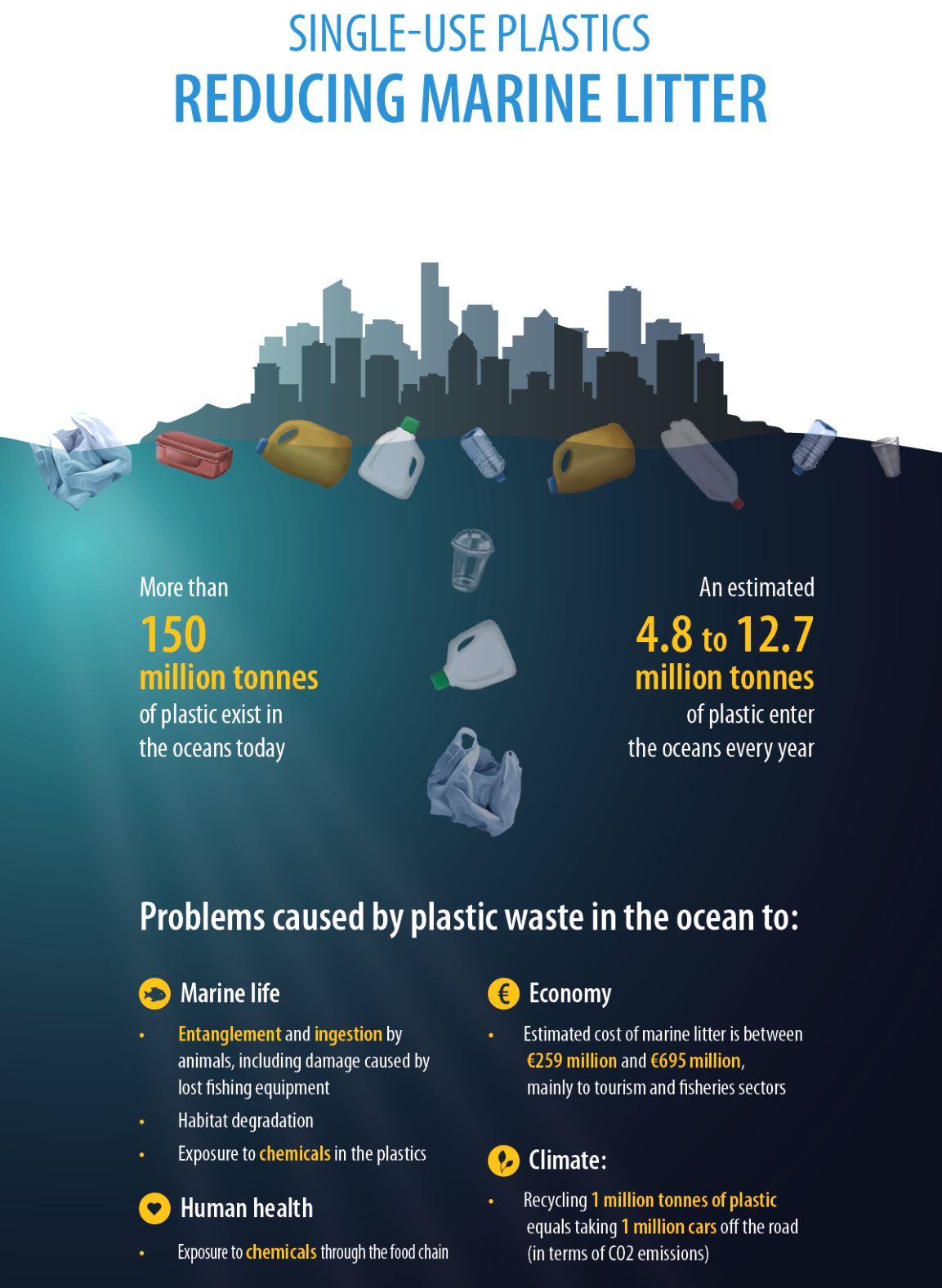
CONFERENCE
On 19 March, the Parliament, together with the European
Commission, will host a conference on the future of oceans, with panel discussions covering global ocean governance; sustainable
blue economy; and healthy, clean seas and oceans.
The conference will start at 14.00 CET with doors opening at noon.
The next ENVI Committee meetings will be held on Monday 11 March (19.30 - 20.00) and Thursday 14 March 2019 (09.00 - 09.30) in Strasbourg and Thursday 21 March 2019 (09.00 - 12.30) in Brussels.
Joint conference of the European Parliament and the European Commission
European Parliament, Brussels – 19 March 2019
12:00 – 14:00 Registration of participants (Atrium welcome point)
14:00 – 15:00 Opening ceremony (plenary chamber)
• Antonio Tajani, President of the European Parliament
• Ioan Denes, Romanian Minister for Water and Forests, Romania (TBC)
• Karmenu
Vella, Member of the European Commission, responsible for Environment, Maritime Affairs and Fisheries
• Gesine Meissner, Special Envoy of the President of the European Parliament on Maritime Affairs
• Carlos Moedas, Member of the European Commission, responsible for Commissioner for Research, Science and Innovation
• Geneviève Pons, Director of Institut Jacques Delors Brussels office
• Christian Solinas, President of Sardinia (TBC)
• Daniela Fernandez, CEO Sustainable Ocean Alliance
Family photo
- Video of Copernicus Project
15:00 – 16:00 Panel 1: Shaping global ocean governance for the future
(plenary chamber)
Chair: Alain Cadec (EPP), Chair of the Parliament’s fisheries committee
Introduction: Alain Cadec (EPP), Chair of the Parliament’s fisheries committee – João Aguiar Machado, Director of the European Commission’s
directorate general for maritime affairs and fisheries – Christian Leffler, Deputy Secretary General of the European External Action Service
• José Inácio Faria (EPP), Ulrike Rodust (S&D), Gabriel Mato (EPP) (TBC)
• Steve Trent, Environmental Justice Foundation
• Maria Damanaki, The Nature Conservancy
• Árni M. Mathiesen, Assistant Director-General FAO Fisheries and
Aquaculture
• Pasquale Legora De Feo, CEO CONATECO S.P.A.
16:00 – 17:00 Panel 2: Achieving healthy, clean seas and oceans
(plenary chamber)
Chair: Adina-Ioana Vălean (EPP), Chair of the Parliament’s committee on environment, public health and food safety
Introduction: Adina-Ioana Vălean (EPP), Chair of the Parliament’s committee on environment, public health and food safety – Jean-Eric Paquet, Director of the European Commission’s directorate general for research and innovation – Joanna Drake, Deputy Director-General for Environment at the European Commission
• Mark Demesmaeker (ECR), Ricardo Serrão Santos (ALDE), Cláudia Monteiro De Aguiar (EPP), Giovanni La Via (EPP)
• Vladimir Ryabinin, Executive Secretary of the Intergovernmental Oceanographic Commission and Assistant Director General of
UNESCO
• Peter Herzig, Executive Director at GEOMAR Helmholtz Centre for
Ocean Research in Kiel
• John Kornerup Bang, Head of Sustainability Strategy and Climate,
MAERSK CEO
• Tiago Pitta e Cunha, CEO Oceano Azul Foundation
Q&A
17:00 – 18:00 Panel 3: A sustainable blue economy, reducing pressures on the oceans
(plenary chamber)
Chair: Jerzy Buzek, Chair of Parliament’s committee on industry, research and energy
Introduction: Jerzy Buzek, Chair of Parliament’s committee on industry, research and
energy – Emma Navarro, Vice-President of the European Investment Bank (TBC) – Pierre Delsaux, Deputy Director-General of the European Commission’s directorate general for internal market, industry, entrepreneurship and SMEs
• Izaskun Bilbao Barandica (ALDE), Clara Eugenia Aguilera García (S&D), Christian Ehler (EPP), Dan Nica (S&D), Jakop Dalunde (Greens/EFA)
• Vitor Verdelho, General Manager at the European Algae Biomass Association (EABA)
• Ester Asin, Director of the WWF European Policy Office
• Emanuele Grimaldi, Co-Managing Director at Grimaldi Group
• Rémi Gruet, CEO Ocean Energy Europe
18:00 – 18:30 Concluding remarks (plenary chamber)
• Karmenu
Vella, European Commissioner for Environment, Maritime Affairs and Fisheries
• Gesine Meissner, Special Envoy of the President of the European Parliament on Maritime Policy
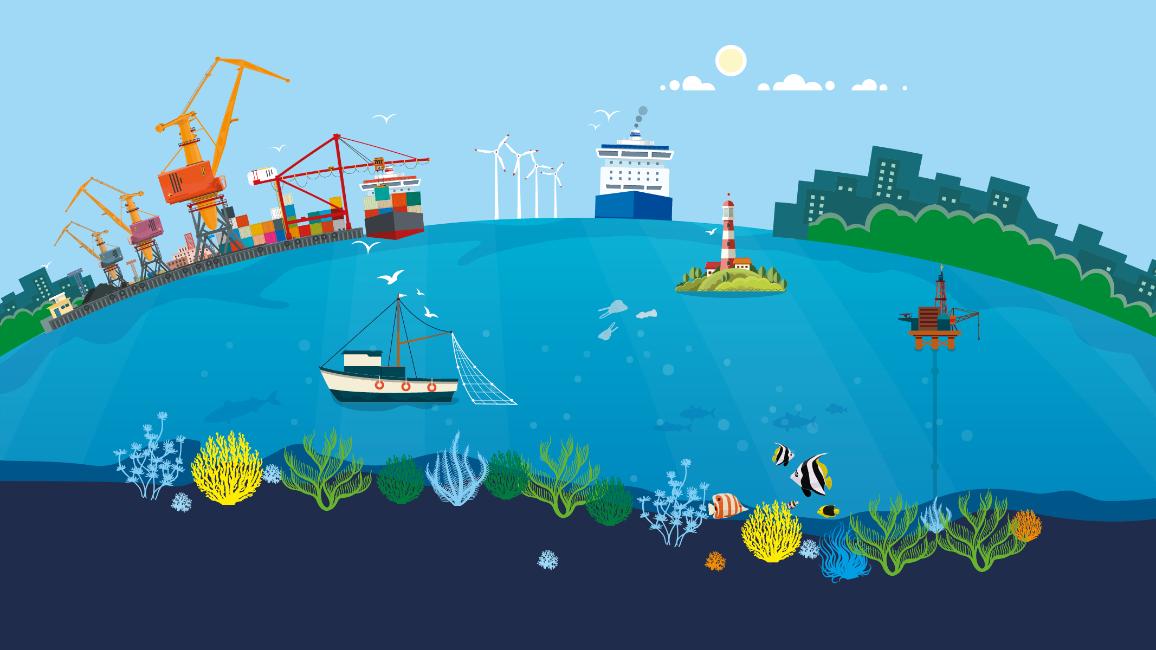
REGISTRATION
The European Parliament will process your data only for the purposes already mentioned and will not transfer this data to anybody outside the Institution. You can exercise your right of access and to rectify your data at any
time, as mentioned in REGULATION (EU) 2018/1725 OF THE EUROPEAN PARLIAMENT AND OF THE COUNCIL of 23 October 2018 on the protection of natural persons with regard to the processing of personal data by the Union institutions, bodies, offices and agencies and on the free movement of such data, as well as exercise your right to have a recourse to the EDPS (edps@edps.europa.eu) or the DPO of the European Parliament (data-protection@ep.europa.eu).
Please be aware that all of the conference’s sessions will be filmed and photographed. All pictures and videos will be posted on the www.europarl.europa.eu website.
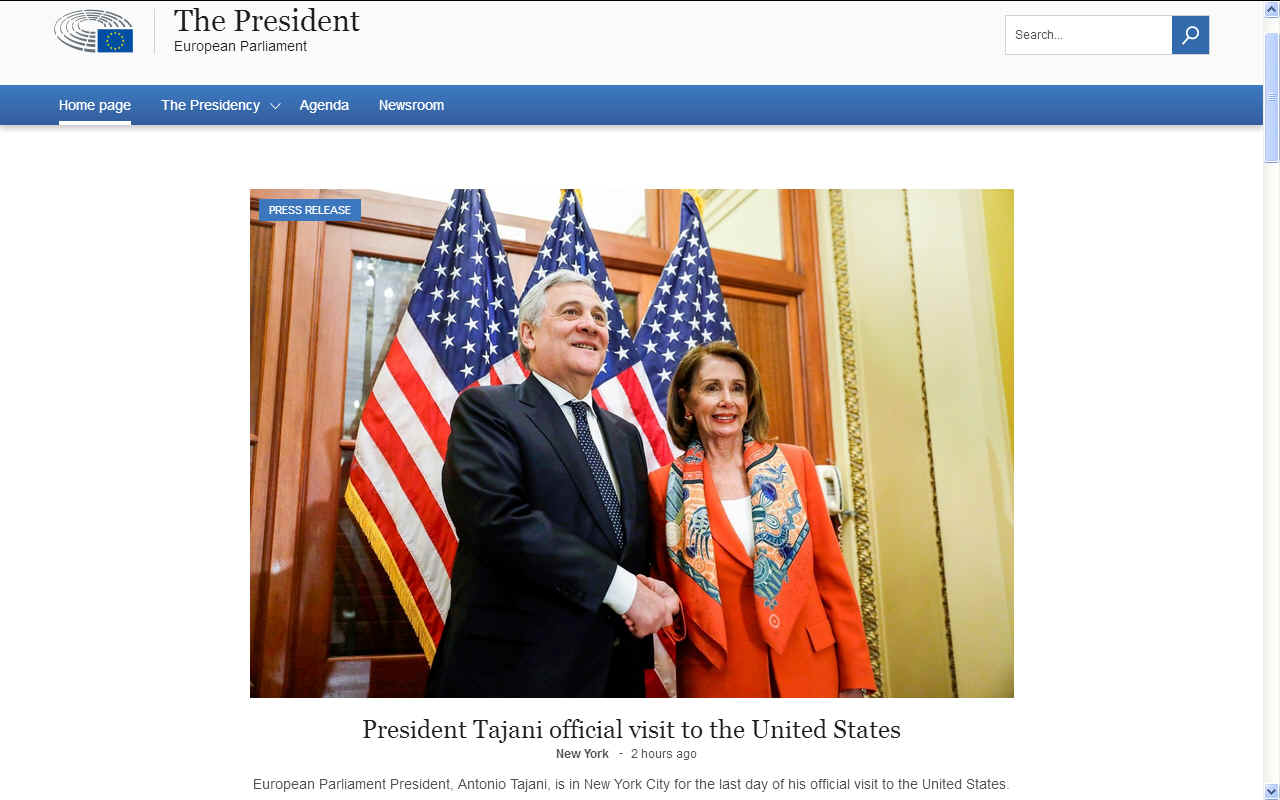
Antonio Tajani
- President of the European Parliament
Rue Wiertz 60
1047 Bruxelles
Belgium
Phone number: +32 (0) 228 46974 (BXL)
Phone number: +33 (0) 3 88 1 74860 (STR)
Phone number: +352 4300 24842 (LUX)
E-mail: president@ep.europa.eu
1995 COP
1,
BERLIN, GERMANY
1996 COP
2, GENEVA, SWITZERLAND
1997 COP
3, KYOTO, JAPAN
1998 COP
4, BUENOS AIRES, ARGENTINA
1999 COP
5, BONN, GERMANY
2000:COP
6, THE HAGUE, NETHERLANDS
2001 COP
7, MARRAKECH, MOROCCO
2002 COP
8, NEW DELHI, INDIA
2003 COP
9, MILAN, ITALY
2004 COP
10, BUENOS AIRES, ARGENTINA
2005 COP
11/CMP 1, MONTREAL, CANADA
2006 COP
12/CMP 2, NAIROBI, KENYA
2007 COP
13/CMP 3, BALI, INDONESIA
2008 COP
14/CMP 4, POZNAN, POLAND
2009
COP 15/CMP 5, COPENHAGEN, DENMARK
2010 COP
16/CMP 6, CANCUN, MEXICO
2011 COP
17/CMP 7, DURBAN, SOUTH AFRICA
2012 COP
18/CMP 8, DOHA, QATAR
2013 COP
19/CMP 9, WARSAW, POLAND
2014 COP
20/CMP 10, LIMA, PERU
2015 COP
21/CMP 11, PARIS, FRANCE
2016 COP
22/CMP 12/CMA 1, MARRAKECH, MOROCCO
2017 COP
23/CMP 13/CMA 2, BONN, GERMANY
2018 COP
24/CMP 14/CMA 3, KATOWICE, POLAND
2019 COP 25/CMP 15/CMA 4 TBA
LINKS
& REFERENCE
http://www.europarl.europa.eu/the-president/en/
http://www.europarl.europa.eu/news/en/headlines/eu-affairs
http://www.europarl.europa.eu/news/en/headlines/eu-affairs/20190213STO26336/future-of-the-blue-planet-parliament-conference-on-oceans
https://www.europarl.europa.eu/committees/en/envi/home.html
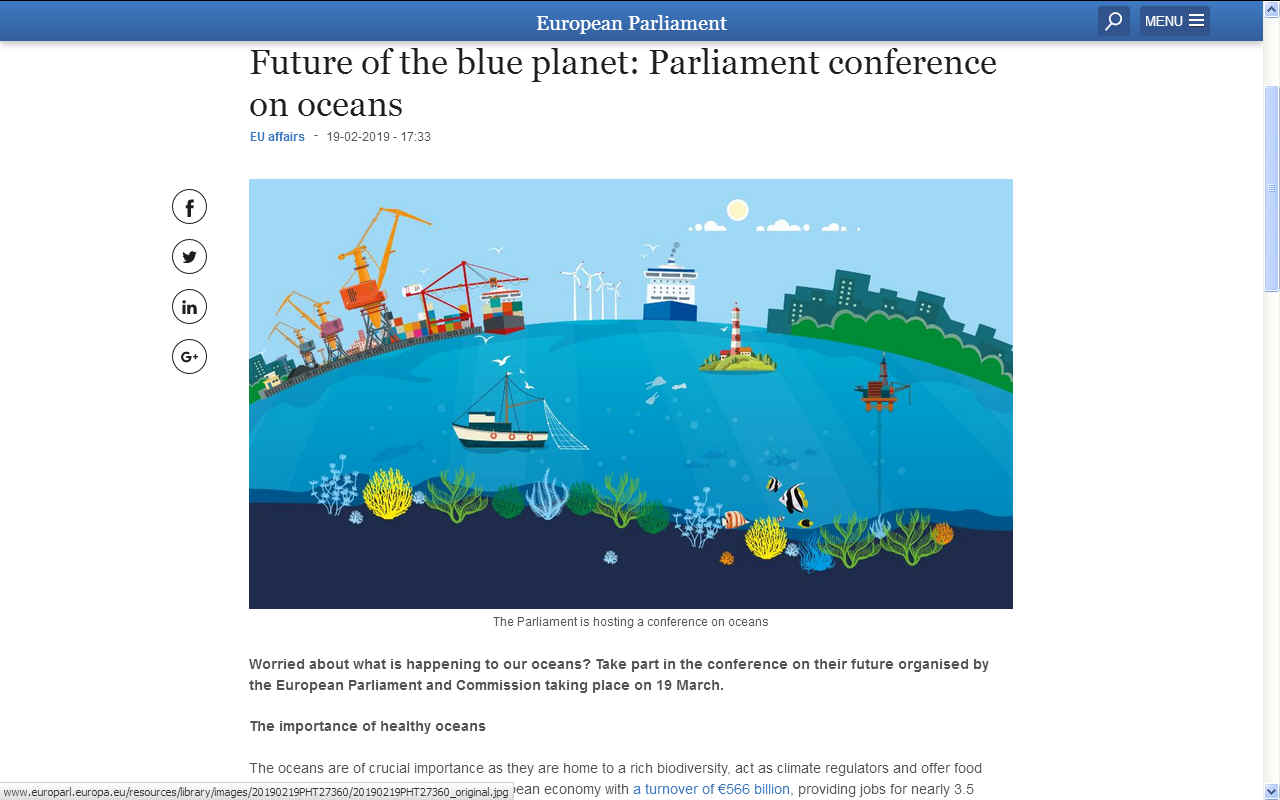
This
website is provided on a free basis as a public information
service. Copyright © Cleaner
Oceans Foundation Ltd (COFL) (Company No: 4674774)
2019. Solar
Studios, BN271RF, United Kingdom.
COFL
is a charity without share capital.
|






